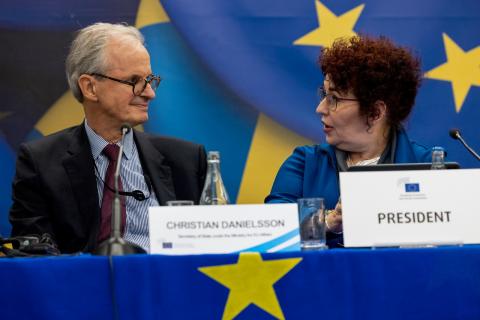European Economic
and Social Committee
EESC discusses 2023 Swedish EU presidency agenda
At the meeting of the European Economic and Social Committee (EESC) in Stockholm, the Swedish State Secretary for EU Affairs Christian Danielsson outlined the political direction of the upcoming Swedish Presidency of the Council of the European Union.
Support for Ukraine and a focus on the EU's green transition and competitiveness: these will be among the watchwords of the Swedish Presidency of the Council of the European Union from January to June 2023.
At the extraordinary EESC Bureau meeting held in Stockholm in the afternoon of 15 November 2022, EESC president Christa Schweng emphasised that, with all the challenges ahead, the EU could only be successful by constantly involving European civil society organisations.
Given the gloomy economic outlook for Europe, we need to set correct and clear priorities, she said. Ensuring recovery and supporting businesses and people confronted with high inflation and especially high energy prices is of key importance for our economies, our societies, and our democracies.
Christian Danielsson, Swedish Secretary of State under the Ministry for EU Affairs, said that there were high expectations on the Swedish presidency to deliver and that the official priorities would be published in December 2022.
We should not shy away from the fact that priorities are important, he said, but the major task of the presidency will be the presidency itself: to move work forward and achieve results which are good for the citizens, the Member States and Europe. We will put enormous effort into it.
Referring to the still ongoing aggression against Ukraine and soaring energy prices, Mr Danielsson highlighted the risk of an economic and social downturn in the EU, adding that the Swedish Presidency would continue to help Ukraine with humanitarian assistance and focus on improving the performance and competitiveness of the EU economy, especially in view of next year's 30th anniversary of the internal market.
More specifically, the Swedish presidency is expected to:
- Speed up the climate transition
- Strengthen the EU's competitiveness for the jobs of the future
- Safeguard the EU's fundamental values
- Provide security for EU citizens and strengthen the EU's role in the world
- Combat organised crime
In the morning's seminar on "Opportunities and challenges of the green transition – the example of Northern Sweden", Ms Schweng also mentioned the important role of civil society organisations in the energy transition, praising the proactive and inclusive approach of the Swedish green model and stressing that Sweden had capitalised on the green transition as an opportunity rather than a threat.
Along the same lines, Sverker Sörlin, a Swedish historian of ideas, professor of environmental history and writer, invited the European and national institutions as well as citizens to take serious responsibility to protect our planet. He pointed out that it was important to actively engage people in society and never stop pushing the governments and asking for more.
